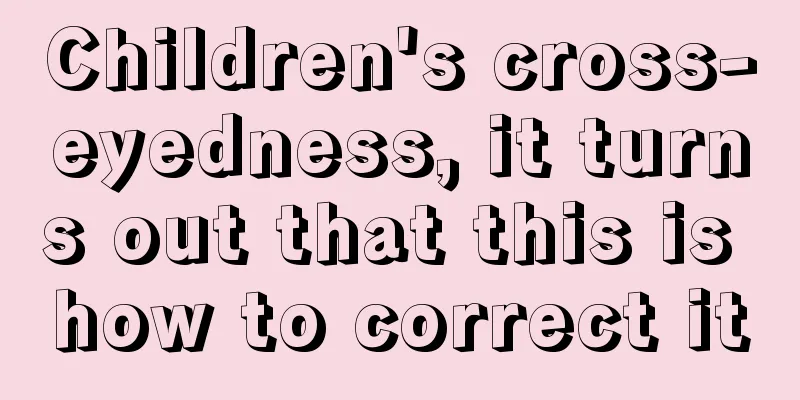Do children need zinc supplements?

|
Zinc is a common trace element. It plays a relatively important role in human health, especially for infants and young children. If zinc is lacking, it will seriously affect the child's growth and development. Therefore, zinc supplementation should be focused on from the birth of the child. In infancy, breastfeeding is the main source of feeding. After the child can eat complementary foods, he should eat more seafood. Do babies need zinc supplements? 1. Babies with insufficient zinc intake Zinc deficiency in pregnant women is likely to lead to insufficient zinc intake in the fetus, increasing the risk of zinc deficiency in the baby after birth. 2. Premature babies The last month of pregnancy is a critical period for the baby to store zinc. Premature babies who miss this period are prone to congenital deficiencies. 3. Babies who are not breastfed Breastfeeding has many advantages, and the same is true for zinc supplementation. It is reported that babies absorb up to 42% of breast milk, and the zinc nutrition in breast milk cannot be replaced by other milk powders. Babies who are not breastfed need to pay attention to zinc supplementation. 4. Babies who are overly picky eaters Babies are in a critical period of growth and development, so their nutritional intake must be balanced. Babies who are overly picky or partial eaters will miss the opportunity to supplement many elements needed by the human body. Therefore, in order to avoid zinc deficiency, it is necessary to cultivate good eating habits for your baby, and not be picky about food, have anorexia, or have a partial diet. 5. Overly active babies Boys in particular sweat profusely after an exercise and lose 1.3 grams of zinc through sweating. 6. Babies with rickets Babies with rickets need to consume a lot of calcium, and the corresponding intestinal ability to absorb zinc is reduced, so these babies are prone to zinc deficiency. 7. Certain special circumstances In addition to the above points, some babies are also prone to zinc deficiency due to factors in their growth environment. For example: if the zinc content in the soil is low or agricultural products are zinc deficient, the baby will definitely absorb less zinc than a normal baby. In addition, if the baby suffers from gastrointestinal diseases or takes tetracycline and other drugs, it will hinder the normal absorption of zinc. Notes on zinc supplementation 1. Use caution when taking zinc supplements When using medication to supplement zinc, it must be done under the guidance of a professional doctor. Do not take zinc supplements blindly, remember to follow your doctor's advice. Generally speaking, zinc supplements should not be taken continuously for 2 to 4 months. Even if you take the medicine as prescribed by your doctor, you should have a check-up in time and arrange the time of taking and stopping the medicine reasonably. 2. Beware of excessive zinc supplementation Zinc is a trace element in the human body, so zinc supplementation must be moderate. Everything is excessive, and excessive intake of zinc can cause many harms, and in severe cases it can even cause zinc poisoning. It may cause nausea, diarrhea, vomiting and other uncomfortable symptoms, and may even lead to anemia, cardiovascular and cerebrovascular diseases, etc. In addition, excessive zinc supplementation will interfere with the normal absorption of other nutrients and have the opposite effect. In detail, if the baby continues to supplement zinc even though he is not zinc deficient, it can easily cause metabolic disorders, and excess zinc in the body is difficult to excrete, which may inhibit the body's absorption of other nutrients such as iron, copper, and calcium, and cause other diseases. The correct approach is to control the zinc element within a reasonable range and make appropriate adjustments. 3. Calcium and zinc cannot be supplemented at the same time The reason why calcium and zinc cannot be supplemented at the same time is that calcium will compete with zinc for transport carriers. If you must supplement them at the same time, there should be a certain time difference between the two, at least 30 minutes, so as to avoid unreasonable absorption due to insufficient carrier. |
<<: How long should children take zinc supplements?
>>: What happens if your baby takes too much zinc?
Recommend
Will roseola infantum recur?
When a child has an emergency, the first thing pa...
What is the reason for a child's belly button to be red?
Sometimes the baby's belly button turns red, ...
How long does it take for children's fever-reducing medicine to take effect?
Under normal circumstances, when people have a fe...
What are the reasons why newborns don't sleep enough?
For newborns, high-quality sleep is more benefici...
Symptoms of albinism in children
When it comes to diseases, many people are famili...
Effects of runny nose in babies
In the 1960s, our country had just embarked on th...
What to apply on children's eczema
Eczema is a common disease. People usually try ma...
Newborn care and feeding?
Newborn babies need extra care in terms of care a...
What is the reason why children cry? These factors are the most common!
For younger children, because they cannot express...
What to do if your child has spermatorrhea
For children, if they grow to puberty, they will ...
Why does a 1 year and 2 month old baby have diarrhea?
As babies grow, colds, fevers, and diarrhea are v...
What disease causes children's frequent blinking?
Each of us needs to blink many times a day, becau...
What should I do if my baby has a fever of 39 degrees and his hands and feet are cold?
The physical health of the baby is an issue that ...
What are the specific development standards for babies in April?
When a baby is just born, parents need to pay att...
What is the standard for the amount of milk a newborn should eat?
The arrival of a new life, while bringing joy and...









